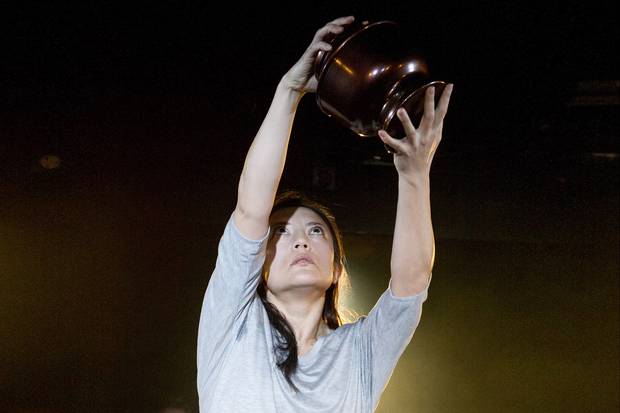Lampedusa, Soho Theatre, W1
reviewed for The Times, 15 April 2015

Louise Mai Newberry in Anders Lustgarten’s Lampedusa
Last year 170,000 migrants risked their lives to cross the Mediterranean into Europe and 5,000 died in its waters. This week hundreds more are feared dead. Yet Anders Lustgarten’s new play, named after Lampedusa, the Sicilian island that has become the flashpoint for Europe’s migrant crisis, isn’t heavy on stats or agitprop. Lampedusa is one of the most gently enticing pieces of storytelling you will see, softly encroaching on the moral consciousness like a lullaby. Yes, it confronts Europe with abject failure in the face of the biggest mass migration since the Second World War. But it’s also, in its tale of sudden kindnesses and unexpected friendships, a heartening ode to joy.
Stefano (Ferdy Roberts), the last of a long line of fishermen, starts by relating the legends of the Med, “Caesar’s highway. Hannibal’s road to glory . . . If you look carefully, my grandfather used to say, you can still make out the wakes of their ships.” Thanks to quotas, there’s not much of a living in fishing, but our man is paid to recover migrant corpses from the sea, “like oiled, lumpy rubbish bags sliding through your fingers”. Lustgarten’s descriptions of drowning have a power that comes from fleshy detail matched by poetic virtuosity. There’s dark beauty here, on the sharp end of Europe’s implosion.
To bring the eurozone crisis closer to home, Lustgarten intercuts this narrative with the tribulations of Denise, a payday loan collector in Leeds, who would probably vote Tory if they weren’t sending benefits assessors round after her disabled mother. It’s here that Lustgarten’s tone can veer towards the preachy — we don’t need to hear about every time the mixed-race Denise has been spat at on the bus to understand that Britain has issues with migration too — but Louise Mai Newberry’s performance is enough to keep us engaged. The recipe is simple: two lyrical monologues, two strong performances and Elliot Griggs’ atmospheric lighting. Shattering.






